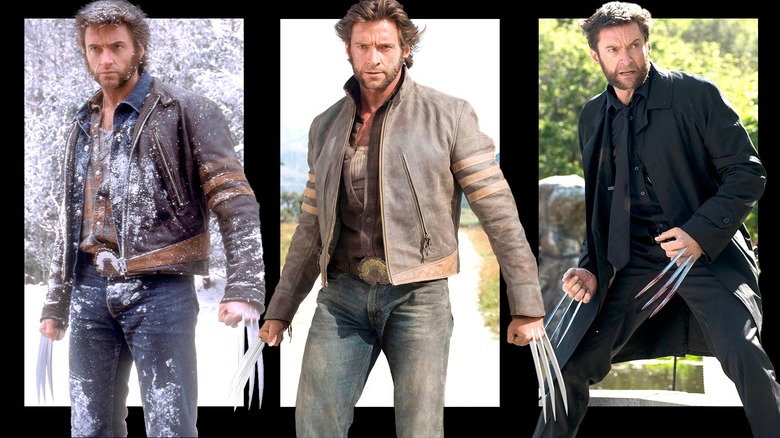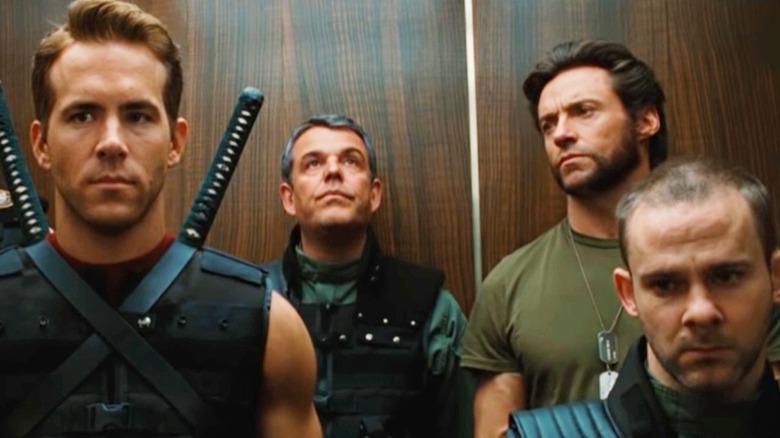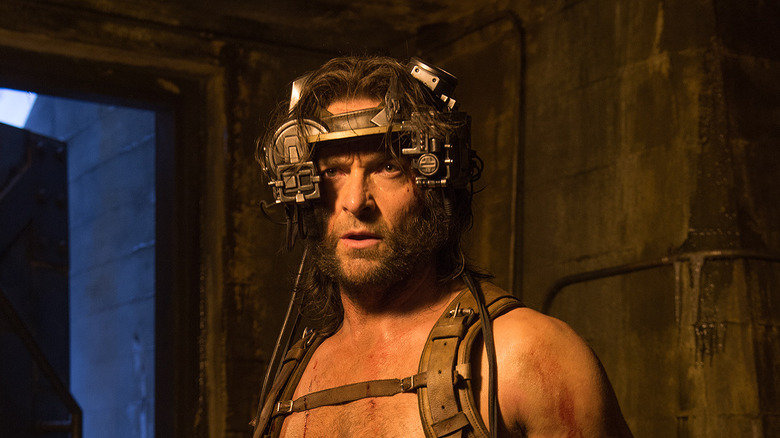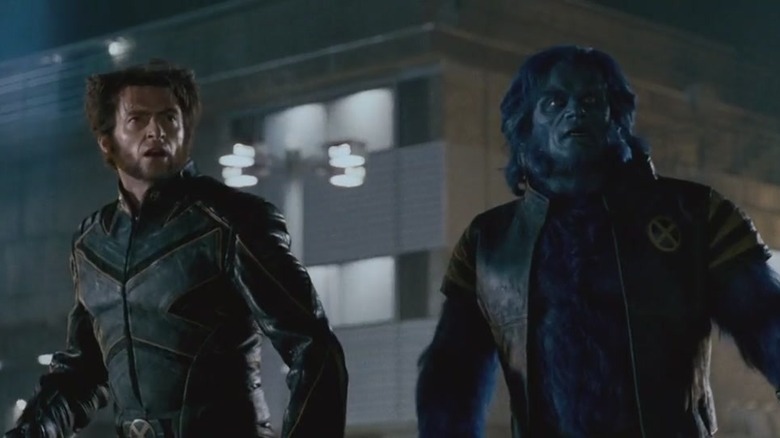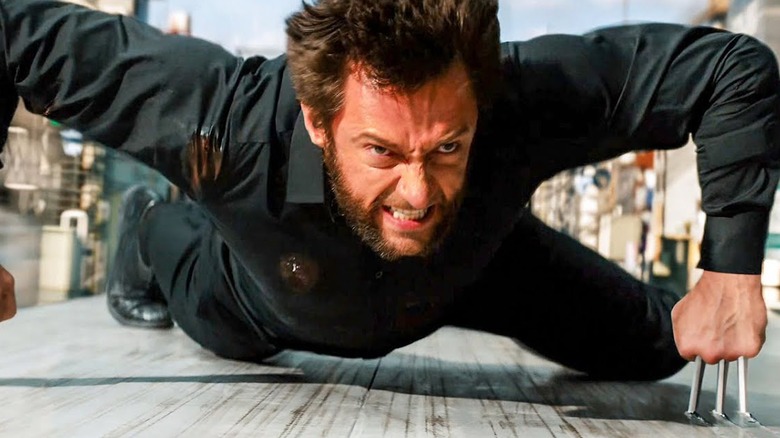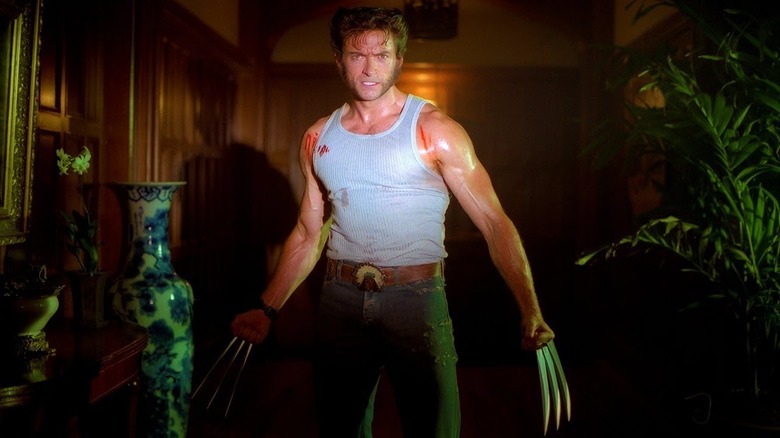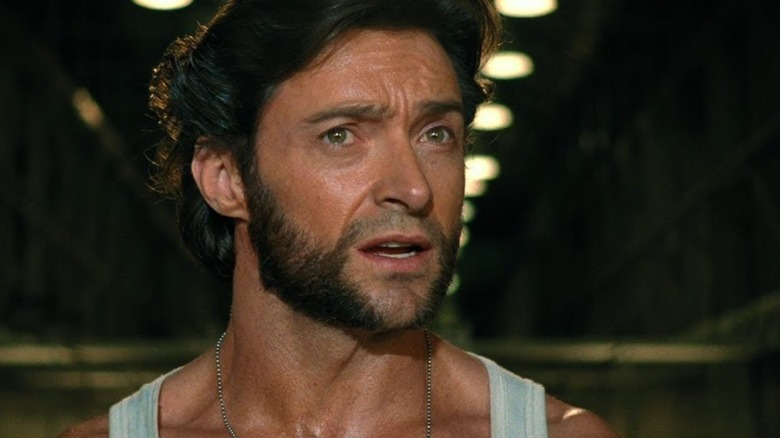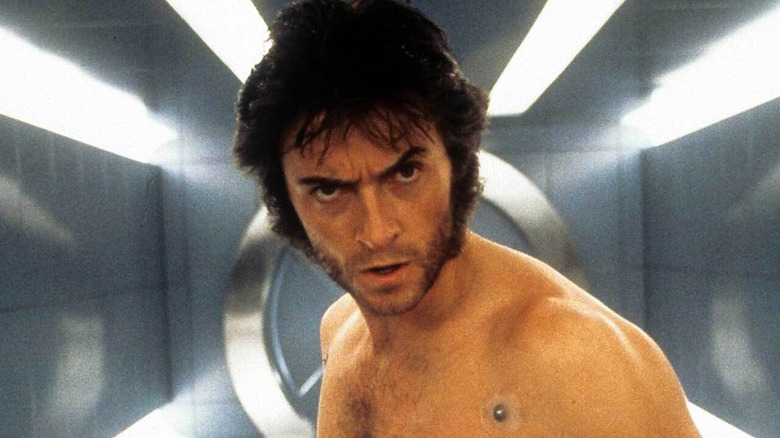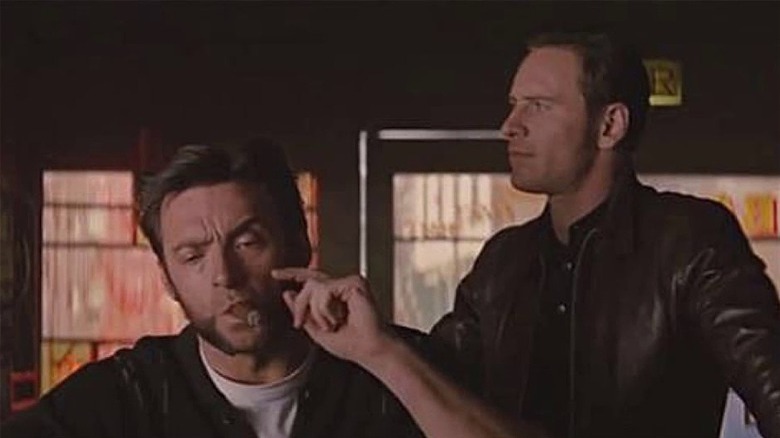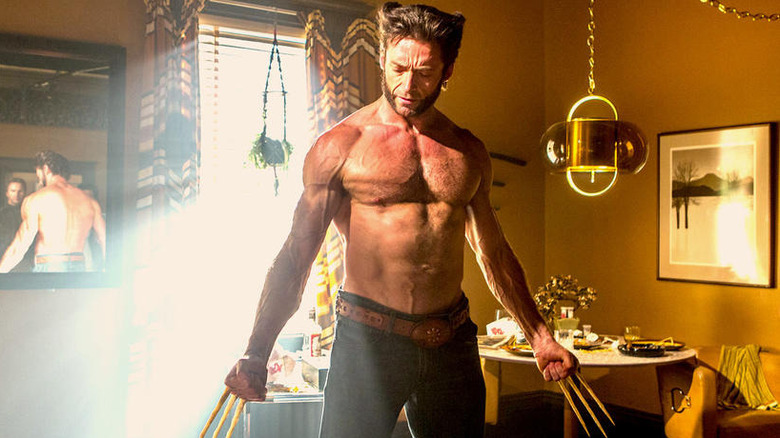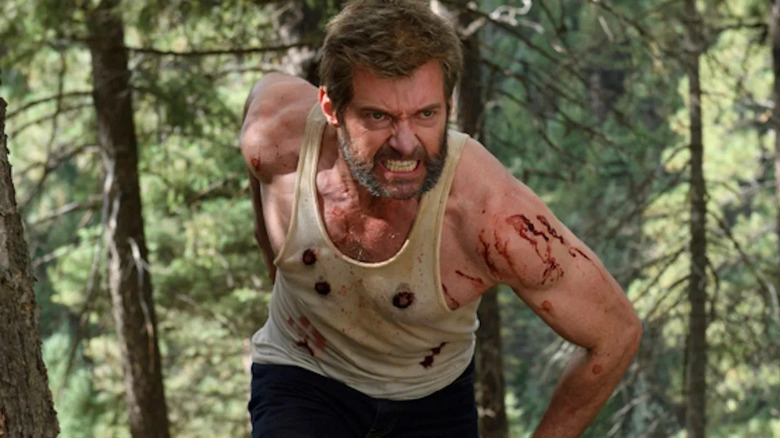Every Live-Action Movie Featuring Wolverine, Ranked
In the wake of Tim Burton's "Batman" movies, Alan Moore's "Watchmen" and "Swamp Thing" run, and the subsequent rise of grim, violent characters like the Punisher and Spawn, X-Men stalwart Wolverine became one of the most popular characters around. With his metal retractable claws, ever-present cigar, and berserker rage mode, he seemed more suited to the moment than some of his more goody-goody mutant hero cohorts. It's safe to say that in the '90s, he was probably the most beloved comics character not to have a movie yet. In part, Hollywood was torn: should they make a Wolverine solo film first, or go full-on X-Men? The majority of superhero movies up to that point featured singular heroes in worlds where no others existed. A team film, then, might stretch credulity with audiences used to suspending disbelief only as far as one.
Well, "X-Men" came out in 2000, and spawned not only a successful franchise of subsequent mutant superhero team movies, but also a trilogy of solo Wolverine movies, and one major cameo in another mutant's individual adventure. Through a quirk of fate and timing, the originally cast Dougray Scott was unable to make it, and an unknown named Hugh Jackman stepped into a role that would last for 10 films ... and counting! With his imminent appearance in #11, currently known as "Deadpool 3," it's as good a time as any to rank the top 10 prior appearances of Wolverine in live-action cinema.
10. X-Men Origins: Wolverine
"Wolverine" was meant to test the waters for a series of "X-Men: Origins" movies, and the results speak for themselves: a proposed follow-up focused on Magneto would become "First Class" instead. It's not as bad as its reputation suggests — Ryan Reynolds took his first crack at Wade Wilson, Kevin Durand makes an unexpectedly great Blob, and Taylor Kitsch looked so cool as Gambit that Channing Tatum tried to steal the character from him for years afterward. The problem, aside from tying Deadpool's mouth shut for the final act, is that Wolverine doesn't need an origin. Not, at least, beyond the revelations about the Weapon X program that the X-Men movies had already given us. A little bit of mystery defined Logan; nobody, to this day, wants to call him James Howlett.
Much of the continuity in "X-Men Origins: Wolverine" has since been outright ignored or retconned without explanation. Patrick Stewart appears in the '70s as a de-aged, walking Professor X, while the character looks like James McAvoy in the '60s and '80s later in the series. Deadpool's origin here is outright negated in the later "Deadpool" films, and a young mutant who appears to be Emma Frost cannot be the same version we meet in "First Class" a decade earlier. Perhaps this entry is best enjoyed if one assumes it's a variant timeline that the TVA promptly cleaned up.
9. X-Men: Apocalypse
Oscar Isaac never claimed that the hierarchy of power in the Fox X-Men universe was about to change, but "X-Men: Apocalypse" is in many ways the "Black Adam" of Marvel movies. With very little plot and lots of fighting with powers, it's like a comic that's all battle scenes. It's fun but disposable. For a practical costume within the X-Men movie aesthetic, Isaac's Apocalypse gear looks impressive enough, and the movie tries to segue the characters into the comics costumes with which fans are most familiar. Sadly, the follow-up, "Dark Phoenix," quickly chucked all that out the window. This was about the time director Bryan Singer was becoming super-unreliable, so it's perhaps unsurprising that few of the choices stick.
Set in the '80s, "Apocalypse" takes a detour to the Weapon X program, allowing Jackman to appear wearing the comics-style helmet at least once, and play Wolverine as pure savage. It's a fun Easter egg in a movie that relies on such things rather than a coherent story.
8. X3: The Last Stand
Another movie that gets more hate than it deserved, "X3" received criticism for rushing both the Dark Phoenix storyline and the mutant cure storyline into one movie. Now that we've subsequently seen a second take on "Dark Phoenix," however, it improves by comparison. Fans at the time found Brett Ratner a significant directorial step down from Bryan Singer; these days, both have seen their reputations collapse.
While Rogue (Anna Paquin) pursues a possible mutant cure, and Magneto (Ian McKellen) moves a bridge, Jean (Famke Janssen) clears up the Wolverine-Cyclops-Jean love triangle by killing Cyclops early on (James Marsden chose Singer's "Superman Returns" instead), and ultimately forcing Wolverine to kill her in order to stop her unchecked destructive abilities. The best that can be said for this story is it provides an emotional core for the subsequent "The Wolverine," with Logan haunted by her death. Its events — and, arguably those of every X-Men movie set between the '70s and 2014, which is almost all of them — have also been retconned out of existence by Wolverine changing the timeline in "Days of Future Past." Unfortunately for fans, that meant the producers would take another shot at Dark Phoenix. Fortunately for Jackman, he's not in that one.
7. The Wolverine
Mostly based on an acclaimed Frank Miller comics miniseries, "The Wolverine" sends Logan to Japan to see old World War II friend Ichiro (Haruhiko Yamanouchi), who wants to take his mutant immortality away. Wolverine refuses, not out of selfishness but doubt that it's a good idea to pass on his "curse," and runs afoul of the Yakuza and ninjas. Meanwhile, he falls for Ichiro's granddaughter Mariko (Tao Okamoto) even as he's still haunted by dreams of Jean.
Though changes were made to better integrate the story into the existing X-Men movie universe, "The Wolverine" adapts the fan-favorite arc fairly faithfully until the climax, when it falls victim to big CG syndrome, and Wolverine has to battle a giant cyborg take on Silver Samurai. Even as he's supposed to have a personal issue with the man in the metal suit, it's the most impersonal-feeling of all the Wolverine solo-movie climactic fights. Nonetheless, this movie was correctly considered a great improvement over "X-Men Origins," and it put director James Mangold in the Wolverine world, where he and Jackman would eventually make their masterpiece.
6. X2: X-Men United
Many fans pick this as their favorite "X-Men," perhaps because it effectively draws from those nerd-hallowed iconic sequels, "The Empire Strikes Back" (hero goes on a dark journey to unveil secrets of their past) and "The Wrath of Khan" (hero gloriously self-sacrifices to save everyone, as the movie leaves unmistakable hints at a big return next time). As for the rest, it's a case of doing what people liked the first time again, and bigger. Brian Cox proves worthy as new foe Col. William Stryker, who plans to hijack Professor X's Cerebro computer and destroy all mutants. Plus, Alan Cumming rocks as Nightcrawler!
As a Wolverine story, it's really all the origin we need, springboarding off of the "God Loves, Man Kills" comic, and pitting him against Kelly Hu's Yuriko. It also very much feels like a middle chapter, but one without a properly planned follow-up. Ironically, "Star Wars" would repeat that particular mistake years later.
5. Deadpool 2
Jackman's likeness appears in the first "Deadpool," but since it's as Jackman rather than Wolverine, it doesn't count. For the sequel, however, Wolverine appears in repurposed footage from "X-Men Origins: Wolverine," as Deadpool goes back in time to kill the mouthless faux-Deadpool from that film. It's one of several end-credits jokes that hits the mark, but the rest of the movie's pretty good too, in both alternate cuts. Assembling and promptly massacring most of X-Force, "Deadpool 2" also introduces Josh Brolin's bitter Cable as a powerful antagonist, and let star Ryan Reynolds pull double-duty as the voice of a plus-sized CGI Juggernaut.
As the movie begins, Deadpool berates Wolverine for stealing his spotlight by dying onscreen, and implies he has to equal that kind of stunt. Though he survives, this may remain a point of contention between the two characters when next they meet. In the meantime, the social media video jabs Jackman and Reynolds keep lobbing at one another remain perhaps the most entertaining side-effect of the characters' perceived rivalry.
4. X-Men
Every comics fan had an opinion of who should be in an "X-Men" film, with Patrick Stewart a rare consensus pick among the public and the producers. For Wolverine, a large, vocal segment of fandom wanted rocker Glenn Danzig, a non-actor who nonetheless looked the part, as a short, muscular, hairy-chested man with big sideburns and a threatening aura. Jackman came to the role mostly unknown, but despite being much taller than Logan is usually drawn, he pulled off the catchphrases, sarcasm, rage, and mildly ludicrous hairdo in a manner embraced instantly by most. A successful team superhero movie hadn't really been pulled off on a large scale before, and with stars like Halle Berry and acting heavyweights such as Ian McKellen involved, it proved to be one pretty big step for superhero cinema, and a giant leap for Jackman into stardom.
Perhaps the only major objection comics fans had was the black leather costumes given to every character in lieu of colorful skin-tight suits. It was the style at the time, and a step away from the mostly immovable muscle suits of the Batman films. When Kevin Feige comes back around to making mutant movies, however, it's a sure bet he'll bring back all the comic colors over the current tactical armor aesthetic.
3. X-Men: First Class
It only took five films to get the X-Men in blue and yellow costumes, plus a time shift back to the '60s and a mostly all-new cast, but "First Class" finally did it. By 2011, of course, audiences had seen increasingly comics-faithful versions of Iron Man and Hulk onscreen, and felt ready for more. What could have been a Magneto (Michael Fassbender) prequel instead also explores the origins of Professor X (James McAvoy) and Mystique (Jennifer Lawrence), and how the global annihilation plans of Sebastian Shaw (Kevin Bacon) exploited the Cuban Missile Crisis and helped drive a wedge between old friends Charles Xavier and Erik Lehnsherr.
Before things turn sour, however, the two look to put together a team, and in a moment that canonizes "First Class" as a prequel rather than a reboot, they come upon Wolverine, and make him an offer. He promptly tells them to go eff themselves, and that's it for Jackman in this one.
His presence in the past will wind up mattering a great deal narratively, and serve as a bridge between casts old and new in what comes next ...
2. X-Men: Days of Future Past
Rather than simply flip the franchise to the new younger cast exclusively, "Days of Future Past" boldly took on the sweeping, Terminator-like comic-book storyline of a dark alternate future caused by changes in the past. It was a story that allowed for older stars like Patrick Stewart and Ian McKellen to exist in the same movie, in the future timeline, while James McAvoy, Michael Fassbender, et al, kept at it in the past. Bridging the gap, unlike in the comics, was Wolverine, who Quantum Leaps into his past self's body to help prevent a dark tomorrow for all.
"X3" cruelly teased the giant robot Sentinels, then revealed them to be just part of a Danger Room simulation. "DOFP" brings them to life, and pits the X-Men against them, and their creator, Bolivar Trask (Peter Dinklage). Expertly balancing a whole host of great characters and actors, it clearly got the folks over at DC thinking along similar lines, though it's only taken them almost a decade to crib the idea of joining past and present stars in a timeline-jumping adventure that resets continuity, albeit using the Flash. "Days of Future Past" delivered a reset that allowed fans and subsequent filmmakers to ignore any elements of previous movies that no longer made sense in continuity. Yet the franchise never delivered as good a movie again thereafter.
1. Logan
As much as Hollywood owes to the template of the hero's journey, it so often leaves out one crucial element — the glorious death. What is the tale of Robin Hood without the final arrow fired to mark his grave? Would Beowulf echo across eternity without the dragon battle that takes him out? Doesn't Achilles need that deadly shot in the heel? It's understandable why the movies don't think so. Kill the hero, kill the revenue stream, they presume. James Mangold managed to craft a last ride for both Professor X and Wolverine by setting it in an unspecified future, perhaps setting the stage for other heroes, like Iron Man, James Bond, and John Wick to meet their own glorious finales, knowing that the larger franchise world will still exist, as "X-Men" did post-"Logan."
Feeling more like the late '90s solo comics featuring Wolverine than the X-Men animated series, "Logan" positions Wolverine as something of a lone claw-slinger in a climate crisis-stricken landscape, caring for a dementia-stricken Professor X who has the power to accidentally kill en masse. Encountering X-23 (Dafne Keen), Logan vows to protect her and save her fellow mutant kids from the ever-present threat of cruel experimentation.
It's fatalistic but righteous, and adds the conceit that in this universe, Marvel comics are loosely based on true stories. It also provides the appropriate heroic ending ... and yet leaves enough timeline room for more, as "Deadpool 3" will — hopefully — find a way to prove.
